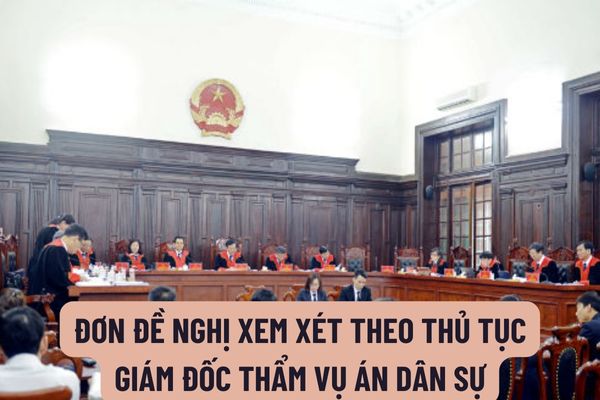What is the application form for consideration according to cassation procedures of a civil case in Vietnam? When should a civil case be considered under the cassation procedures?
What is the application form for consideration according to cassation procedures of a civil case in Vietnam?
The application form for consideration according to cassation procedures of a civil case is Form No. 82-DS issued with Resolution 01/2017/NQ-HDTP. Below is an image of the application form for consideration according to cassation procedures of a civil case:
.jpg)
Download the latest version of the Application Form for consideration according to cassation procedures of a Civil Case: Here.

What is the application form for consideration according to cassation procedures of a civil case in Vietnam? When should a civil case be considered under the cassation procedures? (Image from the Internet)
Vietnam: Which authority has jurisdiction over the cassation of legally effective court judgments, decisions that are appealed?
Based on point a, clause 2, Article 22 of the 2014 Law on Organization of People's Courts, the following is stipulated:
Judicial Council of the Supreme People's Court
1. The number of members of the Judicial Council of the Supreme People's Court is not less than thirteen but not more than seventeen; including the Chief Justice, the Deputy Chief Justices of the Supreme People's Court who are Justices of the Supreme People's Court, and other Justices of the Supreme People's Court.
2. The Judicial Council of the Supreme People's Court has the following tasks and powers:
a) To conduct cassation, and re-hearing of legally effective judgments and decisions of the court that are appealed according to procedural law;
b) To issue resolutions guiding courts to uniformly apply the law;
c) To choose cassation decisions of the Judicial Council of the Supreme People's Court, judgments and legally effective decisions that are standard-setting of courts, summarizing and developing them into case law and publishing them for courts to study and apply in trials;
d) To discuss and provide comments on the report of the Chief Justice of the Supreme People's Court on the work of the courts to submit to the National Assembly, the Standing Committee of the National Assembly, and the President;
đ) To participate in comments on draft laws and resolutions to submit to the National Assembly, draft ordinances, and resolutions to submit to the Standing Committee of the National Assembly;
e) To discuss and provide comments on draft legal documents under the jurisdiction of the Chief Justice of the Supreme People's Court and draft legal documents between the Supreme People's Court and related agencies according to the Law on Promulgation of Legal Documents.
3. Sessions of the Judicial Council of the Supreme People's Court must have at least two-thirds of the total members participating; decisions of the Judicial Council of the Supreme People's Court must be approved by more than half of the total members voting in favor.
The Chief Procurator of the Supreme People's Procuracy, the Minister of Justice are responsible for attending sessions of the Judicial Council of the Supreme People's Court when discussing and approving the resolutions of the Judicial Council of the Supreme People's Court.
4. The cassation or re-hearing decisions of the Judicial Council of the Supreme People's Court are the highest and not subject to appeal.
Thus, according to the above regulation, the Judicial Council of the Supreme People's Court is the authority with jurisdiction over the cassation of legally effective court judgments and decisions that are appealed.
When must a civil case be considered under the cassation procedures in Vietnam?
Based on clause 2, Article 6 of the 2014 Law on Organization of People's Courts, the following is stipulated:
Ensuring the Primary Trial and Appellate Trial Regimes
1. The regimes of primary trial and appellate trial are ensured.
The primary trial judgments and decisions of the court can be appealed according to the procedural law. The primary trial judgments and decisions that are not appealed within the period established by law have legal effect.
Primary trial judgments and decisions that are appealed must be reviewed in appellate trials. The appellate trial judgments and decisions of the court have legal effect.
2. Judgments and decisions of the court that have legal effect discovered to have legal violations or new circumstances as regulated by procedural law must be considered under the cassation or re-hearing procedure.
Thus, according to the above regulation, a civil case must be considered under the cassation procedure when the legally effective judgment or decision of the court is found to have legal violations or new circumstances as regulated by the 2015 Civil Procedure Code.
LawNet